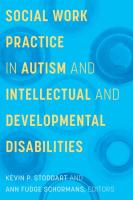Description
This volume provides a range of perspectives, practices, and ideas relative to social work's engagements with individuals living with autism, intellectual disability and developmental disabilities. Contributors in this peer-reviewed volume include social work practitioners, academic and community-based researchers, educators, activists, and self-advocates. Reflecting different ways of theorizing, speaking about, and working with people with autism and intellectual disability and developmental disabilities, it explores both tensions and possibilities for social work practice, research, education, advocacy and policy development that better meet their needs and desires for their lives.
Last updated on
Product Details
- Wilfrid Laurier Universit Brand
- Jan 28, 2025 Pub Date:
- 177112640X ISBN-10:
- 9781771126403 ISBN-13:
- 360.0 pages Paperback
- English Language
- 9 in * 0.75 in * 6 in Dimensions:
- 1 lb Weight:




